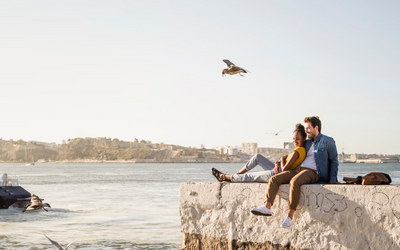Ilana van Huyssteen-Meyer, the group head of private clients at Migronis, recently relocated to Portugal. We talked to Ilana about some insights she could share based on her experience and her conversations with other new Portugal residents.
A friend of Ilana’s recently got a quote of $7,000 for a 20-foot container to ship her furniture from the USA to Portugal. She found this price reasonable, but a month later, closer to her departure date, she got a new quote, and the price had increased to $13,000. Three weeks after, the exact quote was $26,000. Transportation is just one of the many variables to consider when relocating.
If you want to be one of the record numbers of Americans applying for a Golden Visa, here are some guidelines to help you avoid common mistakes.
Where to start: from visa to taxes
The two most popular visa options are the Golden Visa (the investment visa) and the D7 visa, which is a retirement or passive income residency permit. Two key differences between these visas are that a Golden Visa requires an investment in Portugal, but you only need to spend seven days per year or two weeks every two years to renew your permit. On the other hand, a D7 visa requires you to have a residential address (you can buy or rent), but you do need to spend six months continuously or eight months intermittently to be allowed to renew your visa.
There is also a new D3 visa designed specifically for digital nomads. You can learn more about it here.
You will need a NIF(Portuguese fiscal number) regardless of the visa type you choose to apply for. "I call this the keys to Portugal since literally nothing can be done without it," says Ilana. Getting a NIF, however, does not automatically make you a tax resident.
Next, you will need a bank account. You can open an account remotely, but it’s important to make your investment decision before you open a bank account. Some Portuguese banks will not allow investors to invest in private equity funds out of their accounts. Therefore, a consultation with an immigration professional is a good idea before you decide on a bank.
Another topic that is worth consulting an expert on is taxes. In Portugal, a tax regime called the NHR was explicitly created to attract expats. Once again, you can only benefit from the NHR after you become a physical resident in the country.
Read also: New Portuguese Digital Nomad Visa, an ultimate guide
Investment versus family home
Ilana says "I advise many of my clients to separate their Golden Visa investment decision from where they want the next family home to be." You can make a good investment, get your residency permit granted, and earn a yield. After that, take your time to get to know the country before deciding where to settle. The new Golden Visa rules restrict pure residential home investments in areas where many would like to live, so a different approach is required.
If you are applying for a D7, you have no restrictions in terms of location. The most popular areas remain Lisbon, Porto, and the Algarve. If you prefer smaller and quieter towns, see the picturesque options up north like Braga or small coastal towns like Aveiro. You can also consider The Azores and Madeira for a slightly different vibe and lifestyle.
I advise many of my clients to separate their Golden Visa investment decision from where they want the next family home to be
Logistics
In addition to the logistics crunch, you might risk an unplanned customs inspection. For one American family who recently moved, this inspection added an unexpected cost of $10,500 to their relocation.
"When I decided to move some household goods earlier this year, I called several shipping agents, and one particular shipping agent asked me, "how do you feel about Ikea…as the shipping cost has skyrocketed!" says Ilana. Considering the logistics nightmare, buying new furniture and decor once you relocate would be wise. Luckily, Portugal has many large international furniture stores, local furniture manufacturers who produce items in more authentic styles, and a good selection of vintage furniture and decor stores.
Health insurance
In the USA, you typically pay from $1,200 to $1,400 per month for a 50-year-old person for good quality healthcare. In Portugal, it will cost you the same price – but per annum, and the healthcare quality here is excellent. It is easy to obtain and affordable, so you can cross this off your list of "worries."
Remember that Portugal also offers free public healthcare for its citizens and residence permit holders. It covers a wide range of medical services, including childbirth and medical emergencies. The main difference between national and private insurance is that with the second one, you will have to wait significantly less for ordinary check-up appointments with specialists.
Read also: Top-5 countries for investors with the best healthcare systems
Slower doesn’t mean worse
One of the difficulties foreigners face when moving to Portugal is the speed with which bureaucratic issues are resolved. There are regulations for everything, and it doesn’t always make sense for newcomers. This is why many clients use professional companies familiar with the local bureaucratic system (Migronis offers an end-to-end service for clients to ensure the most efficient investment & application process). In any case, remember that all bureaucratic issues in Portugal are eventually resolved – just at a pace that you may not be used to. After all, the more relaxed pace of life is one of the main reasons people move to Portugal.









